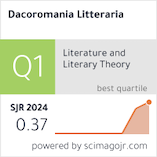CONSTANTINA RAVECA BULEU
LITERARY WORKS GENERATED BY ARTIFICIAL INTELLIGENCE. METHODOLOGY, ACHIEVEMENTS, DILEMMAS
DOI: 10.33993/drl.2024.11.90.107
Affiliation: "Sextil Puscariu" Institute of Linguistics and Literary History, Romanian Academy, Cluj-Napoca Branch.
Contact details: "Sextil Puscariu" Institute of Linguistics and Literary History, 21 Racovita Str., 400165 Cluj-Napoca, Romania.
Email: constantina.buleu@yahoo.com
LITERARY WORKS GENERATED BY ARTIFICIAL INTELLIGENCE. METHODOLOGY, ACHIEVEMENTS, DILEMMAS
(Abstract)
The literary works written by Artificial Intelligence represent a bet with the future, but there are already a few notorious achievements in the field whose number keeps growing, along with the increasing amount of questions and dilemmas generated by the phenomenon, divided, for the moment, between the utopian belief of those who hope that AI “authorship” will be endowed with limitless creativity and the rational scepticism of those who believe that AI creation is actually predetermined by the intrinsic limitations induced by the programming mathematics or the computing logarithms. The list of the literary works generated by ChatGPT or RNN (Recurrent Neural Network) is constantly diversifying, covering a quite surprising area of topics, from 1 The Road (2017), a computerised rewriting of the famous novel On the Road belonging to Jack Kerouac, to The Serious: A Proven Divorce, a hybrid, nonsensical text generated in 2019 by the linguistic model char-rnn-tensorflow. We even have a Sci-Fi eschatology model about the various ways Artificial Intelligence can finish our lives (50 Ways AI Would End the World), while another intriguing scenario is The Inner Life of an AI: A Memoir (2022), about the subtle way Artificial Intelligence submerges into its subconscious in order to perform a self-analysis. My paper focuses on technicalities, controversies and validations issued by the classical criteria of the famous “Turing Test”, several of them being recalled in The Day a Computer Writes a Novel, a famous Japanese experiment completed in 2015, which summarizes the adventure of asking a system named GhostWriter to write two literary textssubsequently submitted for the Hoshi Sinichi Prize, a competition open for both human and non-human writers..
Keywords: Artificial Intelligence, virtual literature, AI literary works, non-human writer, ChatGPT.
CĂRȚI SCRISE DE CĂTRE INTELIGENȚA ARTIFICIALĂ. METODOLOGIE, REUȘITE NOTABILE, DILEME
(Rezumat)
Operele literare scrise de către Inteligența Artificială reprezintă, pe moment, un pariu al viitorului, însă există deja câteva reușite notorii, numărul lor sporind simultan cu multitudinea de întrebări și dileme generate de către acest fenomen, situat la intersecția dintre utopia de a-i conferi „autoarei” o libertate deplină și limitările inerente impuse de logaritmii de programare computerizată. În continuă creștere, lista de cărți generate cu ajutorul unor programe precum ChatGPT sau RNN (Recurrent Neural Network), conține o surprinzător de mare varietate de texte, de la 1 The Road (2017), replică la faimosul roman On the Road al lui Jack Kerouac, la texte abstruze, lipsite de sens gramatical sau ideologic, cum e The Serious: A Proven Divorce (2019), generat de modelul lingvistic char-rnn-tensorflow. Există chiar și o eschatologie SF privind modul în care Inteligența Artificială ar putea distruge lumea (50 Ways AI Would End The World), incitantă fiind și autoanaliza pe care și-o face IA în The Inner Life of an AI: A Memoir (2022). Lucrarea de față își propune să focalizeze asupra câtorva aspecte tehnice, controverse sau validări bazate pe „testul Turing”, textul de referință constituindu-l un experiment japonez din 2015, intitulat The Day a Computer Writes a Novel, care constituie experiența generării a două texte cu ajutorul programului GhostWriter, propuse pentru Premiul Hoshi Sinichi, deschis și scriitorilor non-umani.
Cuvinte-cheie: Inteligența Artificială, literatura virtuală, texte literare generate de Inteligența Artificială, scriitor non-uman, ChatGPT.


